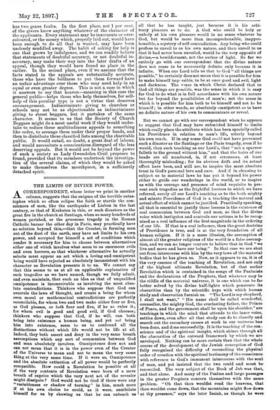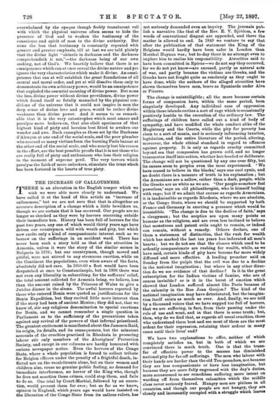THE LIMITS OF DIVINE POWER.
ACORRESPONDENT, whose letter we print in another column, suggests that the enigma of the terrible catas- tophes which so often eclipse the faith or startle the con- sciences of men, like the earthquake of Lisbon in the last century, or that of Krakatoa in this, or such disasters as the great fire in the church at Santiago, when so many hundreds of women perished, or the gruesome tragedy in the Roman Catholic bazaar the other day in Paris, may practically have no solution beyond this,—that the Creator, in forming man out of the dust of the earth, may have set limits to his own power, and accepted for himself a set of conditions which render it necessary for him to choose between alternatives either one of which involves what seem to us enormous evils and even horrors, so that whichever alternative he actually selects must appear an act which a loving and omnipotent being would have rejected as absolutely inconsistent with his character as Revelation presents it to us. We cannot say that this seems to us at all an applicable explanation of such tragedies as we have named, though we fully admit, and even maintain, that such an idea as that of unqualified omnipotence is inconceivable as involving the most abso- lute contradictions. Thinkers who suppose that God can overrule the laws of thought, and create a being for whom even moral or mathematical contradictions are perfectly reconcilable, for whom two and two make either four or five, as God pleases, or both four and five, if he so rules it ; for whom evil is good and good evil, if God chooses ; thinkers who suppose that God, if he will, can both bring into existence a human being, and yet not bring him into existence, seem to us to confound all the distinctions without which life would not be life at all. Indeed, they both assert and deny in the very same breath assumptions which any sort of communion between God and man absolutely involves. Omnipotence does not and can not mean that it is in the power even of the Creator of the Universe to mean and not to mean the very same thing at the very same time. If it were so, Omnipotence and the absolute extinction of all power would be perfectly compatible. How could a Revelation be possible at all if the very contents of Revelation were born of a mere breath of caprice which the very next act of the revealer might dissipate ? God would not be God if there were any 'variableness or shadow of turning" in him, much more if at his own choice he could, as it were, annihilate himself for us by showing us that he can unteach us all that he has taught, just because it is his arbi- trary pleasure so to do. A God who could be holy or unholy at his own pleasure would in no sense whatever be God, but would be more than incomprehensible, inappre- hensible, a mystery of self-contradiction. Any being who could profess to unveil to us his own nature, and then unveil to us that it had never been unveiled, would be the very opposite of divine,—a bewilderment, not the author of light. So far we entirely go with our correspondent that the divine nature does not cease to be necessarily definite only because it is infinite. When our Lord tells us that to God " all things are possible," he certainly does not mean that it is possible for him to make himself imp, ssible, to be at once good and evil, light and darkness. The Psnse in which Christ declared that to God all things are possible, was the sense in which it is easy for God to do what is in full accordance with his own nature but far beyond the possibilities of man's ; not the sense in which it is possible for him both to be himself and not to be himself ; in other words, so absolutely omnipotent as to have no definite nature of his own to communicate or reveal.
But we cannot go with our correspondent when he appears to suggest that God may have submitted himself to limits which really place the attribute which has been specially called his Providence in relation to man's life, utterly beyond his own reach. If in any sense God could not have prevented such a disaster as the Santiago or the Paris tragedy, even if he would, then such teaching as our Lord's, that " not a sparrow falleth to the ground without him," and that the hairs of our heads are all numbered, is, if not erroneous, at least thoroughly misleading ; for its obvious drift and its actual effect have been, and still are, to inspire the most absolute trust in God's personal love and care. And if in choosing to subject us to material laws he has put it beyond his power either to guide our wanderings in the world, or to inspire us with the courage and presence of mind requisite to pre- vent such tragedies as the frightful horrors to which we have referred, surely all our Lord's teaching as to the both mighty and minute Providence of God is a teaching the natural and actual effect of which cannot be justified. Practically speaking, all that is essential to justify these lessons is the existence of real communion between God and man, so that the divine voice which instigates and controls our actions is to be recog- nised as a real influence of the first magnitude in the ordering of our life. If that is a real influence, then the great doctrine of Providence is true, and is at the very foundation of all human religion. If it is a mere illusion, the assumption of almost all the greater religions of the world is a false assump- tion, and we can no longer venture to believe that in God " we live and move and have our being." In that case we are shut out from intercourse with him by the very laws of the material bodies that he has given us. Now, as it appears to us, it is of the very essence of the teaching of Revelation, and not only of the highest ultimate Revelation, but of that earlier Revelation which is contained in the songs of the Psalmists and the declarations of the Prophets, that whatever may be the riddle of the material universe, it is one which can be far better solved by the divine half-lights which penetrate its obscurities than by the scientific keys with which human study and observation furnish us. " The Lord is my shepherd, I shall not want," " His name shall be called wonderful, counsellor, the mighty God, the everlasting father, the Prince of Peace, and the government shall be upon his shoulder," are teachings in which the mind that attends to the inner voice, settles down, even after all that study can do to classify and search out the secondary causes at work in our universe has been done, and done successfully. It is the teaching of the con- science and of the spiritual insight, which shines through all the obscurities of the outward framework by which we are enveloped. Nothing can be more certain than that the whole course of the development of the Jewish conception of God fully recognised the difficulty of reconciling the physical order of creation with the spiritual testimony of the conscience with reference to God's immanent intercourse with the soul of man, and yet insisted that the two could and must be reconciled. The very subject of the Book of Job was that,. and that alone. And many of the Psalms and large passages in the greater Prophets concern themselves with the same problem. " Oh that thou wouldst rend the heavens, that thou wouldst come down, that the mountains might flow down at thy presence," says the later Isaiah, as though he were
overwhelmed by the opaque though feebly translucent veil with which the physical universe often seems to hide the presence of God and to weaken the testimony of the conscience and spirit of man to the divine authority. But none the less that testimony is constantly repeated with greater and greater emphasis, till at last we are told plainly that the divine light " shineth in darkness and the darkness comprehendeth it not,"—the darkness being of our own making, not of God's. We heartily believe that there is no omnipotence which can at once reveal the divine nature and yet ignore the very characteristics which make it divine. An omni- potence that can at will establish the great foundations of all mental and moral order, and yet at will dissolve them only to demonstrate its own arbitrary power, would be an omnipotence that exploded the essential meaning of divine power. But none the less, divine power without divine providence, divine power which found itself so fatally manacled by the physical con- ditions of the universe that it could not inspire in men the deep sense of divine love and grace, would be rather divine weakness than divine power. And it seems to us remark- able that it is the very catastrophes which most amaze and paralyse mere lookers-on, that also elicit specimens of that highest kind of piety and heroism best fitted to awaken our wonder and awe. Such examples as those set by the Duchesse d'Alencon at one end of the social scale, and the poor plumber who rescued so many victims from the burning Paris bazaar at the other end of the social scale, and who nearly lost his reason in the effort, are the beet possible proofs that it is not those who are really full of piety and enthusiasm who lose their religion in the moment of supreme peril. The very terrors which paralyse the faith of mere onlookers, stimulate the trust which has been fostered in the hearts of true piety.







































 Previous page
Previous page